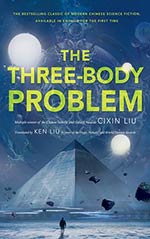
![]() thecynicalromantic
thecynicalromantic
6/5/2015
![]()
I've been dropping the ball pretty hard on a lot of my book clubs, and BSpec's book club to read Liu Cixin's The Three-Body Problem is no exception, except that I actually DID make it to the book club. I was surreptitiously (OK, not that surreptitiously) attempting to read the last 10% or so of the book during the meeting, and I finished the book the following morning.
This is not because the book was not good. It's because parts of the book were not good, and when I got to those parts, I'd space out and spend time dicking around on my phone or thinking judgmental thoughts about real life things (don't ask) and otherwise not making any progress despite sitting on the couch or my bed for pretty substantial periods of time. But the bits that were good were really good, which is why I kept attempting to read.
Three-Body Problem is a Chinese novel that has a lot of elements of what I'm familiar with as sort of Golden Age-y/"classic" science fiction, including both the fun bits that make me feel like I ought to read more classic sci-fi and the doofy bits that are why I don't. I can certainly see why the more dedicatedly sci-fi-oriented parts of SF/F fandom like it, but I think it could have been edited down one or two hundred pages (probably the same way a lot of sci-fi fans feel about the long Victorianesque food-porn-ridden fantasy doorstoppers I like to read).
Things that were good included everything to do with the video game, the space bits at the end with folding the proton, the story of the Trisolaran listener, the characterization of the one character who actually has characterization (she's the bad guy, but whatever), the one scene where they actually use the bloody nanofilaments that are the whole reason the "protagonist" is even in the story, and some of the discussion about the Cultural Revolution and the Chinese political situations in general. I was also kind of impressed at the way it managed to provide a sympathetic look at pretty much all sides of the conflict--it was nihilistic as shit, but I really felt for the aliens who were going to invade, and the humans who sold the planet out to the aliens, and the "evil" environmentalists, and also the people who, you know, didn't want aliens to invade and murder us all, even though the anti-aliens-invading side really had fewer and less compelling arguments.
Things that were less good: the protagonist was boring as hell. In fact, all but one of the characters were there just to be their jobs and had no discernible characterization outside of "having expertise in such-and-such because that's their job," although the "dirty cop" character was kind of fun, if only because he seemed to have been borrowed from a different genre so at least he shook things up a bit. There was a bit too much technobabble and longwinded discussion of physics for me, especially since it definitely seemed to be doing the classic Golden Age Scifi That Is Not Considered Literature (And This Is Why, Dammit) thing of substituting technobabble/sciencebabble for characterization. There was also some weird gender stuff, some really odd sexualization of some of the female characters at really inappropriate times (like... when bloodcrazed teen girl Red Guards are murdering people or being murdered) that took me out of the narrative, the kind of stuff that makes me stop thinking "Aliens are invading; what happens next?" and instead reminds me "I am sitting on a couch reading words that were made up and written down by a dude; that is what is going on right now. What will the next words be and will they be any good?" There were a couple of continuity issues, like the boring protagonist had a wife and son for one scene in the beginning when he needed them to take pictures, but then they are never mentioned again.
I know I am clearly missing a whole lot about Chinese culture and storytelling and the political realities of what can and cannot get published in China, and I'd love to know more about that (Sarah provided some insight in our discussion, secondhand from her Chinese grad school roommates who had read the book before it was available in English and apparently had a lot of opinions about it) (thanks, Sarah!). But I'm still not 100% sure I'm going to read the second volume? I might if I'm feeling particularly nihilistic, but generally if I'm going to read an underedited 800-page genre monstrosity I'm going to go for some sort of dark fantasy with too much characterization (and food porn) (and dresses) rather than too much physicists talking about how physics is, like, everything there is, man.
http://bloodygranuaile.livejournal.com/66739.html